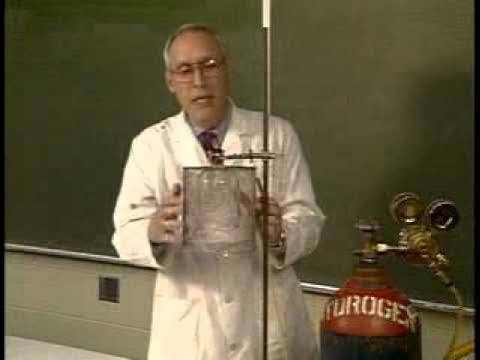Hydrogen Bonds - What Are Hydrogen Bonds - How Do Hydrogen Bonds Form
Summary
TLDRThis video explains hydrogen bonds, focusing on their formation, strength, and significance in water molecules. It describes how water molecules are polar, with partial positive and negative charges due to the unequal sharing of electrons. This polarity leads to hydrogen bonding between water molecules, which is weaker than ionic or covalent bonds but can be strong in large numbers. The video also explores how hydrogen bonds influence the properties of water, such as its liquid and solid forms, and highlights their role in biological molecules like proteins and DNA. Additionally, it explains why water and oil do not mix due to their differing polarities.
Takeaways
- 😀 Hydrogen bonds are weak attractive forces that occur between certain molecules.
- 😀 These bonds are weaker than ionic or covalent bonds but can exert a strong force when numerous hydrogen bonds are present.
- 😀 Hydrogen bonds result from an unequal charge distribution in a molecule, making it polar.
- 😀 Water molecules are polar, with a slightly positive charge on the hydrogen atoms and a slightly negative charge on the oxygen atom.
- 😀 The unequal sharing of electrons between oxygen and hydrogen in water causes this polarity.
- 😀 In water, hydrogen bonds form between the positive hydrogen end of one molecule and the negative oxygen end of another.
- 😀 Water in liquid form has a few hydrogen bonds, solid water (ice) has many hydrogen bonds, and in steam or gas form, water molecules are too far apart to form hydrogen bonds.
- 😀 Hydrogen bonds also play a key role in the structure of proteins and nucleic acids.
- 😀 Water and oil do not mix because water molecules are polar and form hydrogen bonds, while oil molecules are nonpolar and do not interact with water.
- 😀 Lipids (fats and oils) are nonpolar, meaning they do not form hydrogen bonds with water molecules.
- 😀 The behavior of hydrogen bonds explains why substances like water have unique properties like surface tension and high boiling points.
Q & A
What is a hydrogen bond?
-A hydrogen bond is an attractive force that can exist between certain molecules. It is weaker than ionic or covalent bonds because it takes less energy to break these bonds, but when many of them form, they can exert a strong force.
Why are hydrogen bonds weaker than ionic or covalent bonds?
-Hydrogen bonds are weaker because they involve a less significant difference in charge compared to ionic or covalent bonds, making it easier to break them with less energy.
What causes hydrogen bonds to form?
-Hydrogen bonds form due to an unequal charge distribution within a molecule, making the molecule polar. The positive end of one molecule is attracted to the negative end of another.
What makes water molecules polar?
-Water molecules are polar because of the unequal sharing of electrons between oxygen and hydrogen atoms. Oxygen pulls electrons closer, giving it a partial negative charge, while hydrogen has a partial positive charge.
How do hydrogen bonds form in water?
-In water, the partial positive charge of the hydrogen atoms in one water molecule is attracted to the partial negative charge of the oxygen atoms in adjacent water molecules, forming hydrogen bonds.
How do hydrogen bonds behave in different states of water?
-In liquid form, water molecules form a few hydrogen bonds. In solid form (ice), many hydrogen bonds exist, but in the gas state (steam), the molecules are too far apart to form hydrogen bonds.
What are the characteristics of molecules that form hydrogen bonds?
-Hydrogen bonds form between hydrogen atoms that are covalently bonded to highly electronegative atoms such as oxygen, nitrogen, or fluorine.
Why don't water and oil mix?
-Water and oil do not mix because water is a polar molecule and oil is nonpolar. Water molecules are attracted to each other and form hydrogen bonds, which separates them from the nonpolar oil molecules.
How does polarity affect the behavior of molecules?
-Polarity affects how molecules interact. Polar molecules, like water, attract each other and form bonds, while nonpolar molecules, like oil, do not form bonds with polar molecules, causing them to separate.
What role do hydrogen bonds play in the structure of proteins and nucleic acids?
-Hydrogen bonds are essential in stabilizing the structure of proteins and nucleic acids. They help maintain the three-dimensional shapes of these molecules, which are crucial for their biological functions.
Outlines

This section is available to paid users only. Please upgrade to access this part.
Upgrade NowMindmap

This section is available to paid users only. Please upgrade to access this part.
Upgrade NowKeywords

This section is available to paid users only. Please upgrade to access this part.
Upgrade NowHighlights

This section is available to paid users only. Please upgrade to access this part.
Upgrade NowTranscripts

This section is available to paid users only. Please upgrade to access this part.
Upgrade NowBrowse More Related Video

Polar Bonds and Hydrogen Bonds

Hydrogen bonding | Intermolecular forces and properties | AP Chemistry | Khan Academy

Biochemistry Water, PH and Buffers Part 1 tutorial

Chemical Bonds

Chemical Reactions: Hydrogen and Oxygen form Water

Autoionization of water | Water, acids, and bases | Biology | Khan Academy
5.0 / 5 (0 votes)